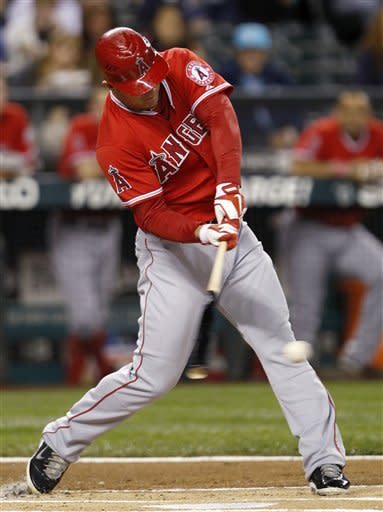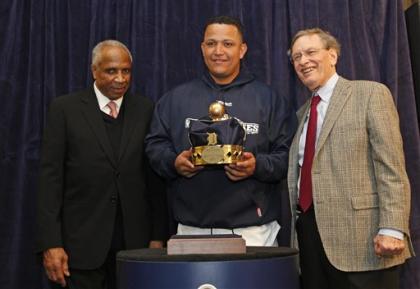Stats revolution doesn't have enough political muscle to reward AL's true MVP: Mike Trout
A few days before the presidential election, some of the nation's most weathered political pundits zeroed in on a common enemy. His name is Nate Silver. He is a 34-year-old economist from Chicago. He is relatively famous now because the very thing for which the pundits derided him – his numbers-based system projecting the results of the presidential race – turned out to be 100 percent accurate. Barack Obama may have won the presidency, but Nate Silver won the election.

Silver took no time to gloat, for he was merely a proxy, the latest bespectacled face to represent the tried-and-true discipline of mathematics. As it has evolved from simple counting to mind-blowing string theory, math has been doubted, distrusted and disbelieved. Pythagoras, Aristotle, Galileo and even Silver: The most talented can bend numbers at their whim, though they know better than to do so. For to be taken seriously – to win over people determined not to be won lest it exterminate the usefulness of the opinion they've spent years selling as informed – the numbers must always be fair and right.
Slowly, the political world will come around. And we know it will be slow because this is exactly what happened about 15 years ago when Silver and a handful of others at the forefront of the sabermetric revolution took the ideas of Bill James and started distributing them to an Internet baseball audience that was hungry for knowledge beyond what the establishment foisted upon them for the entirety of the sport's history.
[Y! Sports Fan Shop: Buy Mike Trout AL Rookie of the Year, Angels apparel]
On Thursday, when Miguel Cabrera wins the American League Most Valuable Player award over Mike Trout, the disciples of Silver at Baseball Prospectus and FanGraphs and manifold other sabermetric sites will bray on about how the Baseball Writers Association of America embarrassed itself with such a lopsided vote. And all of the critics will be right. Trout, the unanimous AL rookie of the year, was the best player in the league this season, eons better than Cabrera, which is amazing because Cabrera capped off his superlative season with a superlative accomplishment: the Triple Crown. Trout's own triple crown, despite the lowercase letters, is far more impressive: He was among the five best hitters, fielders and baserunners in a game with about 400 position players on rosters at any given time.
While executives, scouts and others paid to objectively assess the game are almost universal in agreement that Trout is the better candidate, the fallibility of human subjectivity colors opinions enough that something neutral and impartial can serve as a better arbiter. That is the role of statistics in baseball, which embraced numbers as a touchstone of success from its early days. Granted, the numbers that came to denote offensive prowess – batting average, home runs and runs batted in – were far from the best troika to do so. Still, baseball's acknowledgement of statistics was, like politics' acceptance of polling data, a proper foundation upon which greater truths could be gleaned.
[Related: Ultimate MLB free-agent tracker]
The political world is where baseball was almost two decades ago, beginning to see that reality. The most stubborn pundits believed that Silver's interpretation of polling data was wrong. They believed the presidential race was a dead heat. Maybe they did so because a runaway would draw far less interest and viewership throughout the night of Nov. 6 – that their place in a television landscape riddled with choices becomes far less safe with diminished ratings, and that the idea of television punditry, already a swampland of blah, blah and more blah, would project as increasingly inconsequential.
There was some of that, sure, but Nate Silver's truths, in baseball and politics, found people's psyches were collateral damage from the attack of their flawed ideas. The comforts of what we know – of what we've been told, of what we believe, of what we want that truth to be – are a soft pillow, a warm blanket and a Tempurpedic bed. Abandoning what we think is right for something different takes curiosity and courage the likes of which so many don't have. Nobody wants to be wrong, and Silver happens to be in a business of proving as much.
It's why so many Cabrera supporters – many intelligent people whose refusal to accept what mathematics now tells us is borne of stubbornness, a quality to which any of us can cop – tried to muddy the Trout-Cabrera argument with Wins Above Replacement. WAR is a metric that purports to capture a player's value in a nice, neat number, compared to what a replacement-level player – a scrub from Triple-A – historically has produced. WAR can compare pitchers to hitters, players from the 1950s to the 2010s, shortstops to catchers to right fielders.
Trout bludgeoned Miguel Cabrera in WAR this season. By Baseball-Reference.com's calculations, Trout had 10.7 WAR and Cabrera 6.9. FanGraphs' version of WAR wasn't much better: 10 to 7.1. The reductive nature of the anti-WAR arguments was insulting to anybody who parsed Trout and Cabrera's candidacy with an open mind. The thinking went like this: How can WAR be any good if it says Trout was that much better than Cabrera? Which was the same thing as MSNBC's Joe Scarborough saying about Nate Silver, "Anybody that thinks that this race is anything but a toss-up right now is such an ideologue, they should be kept away from typewriters, computers, laptops and microphones for the next 10 days, because they're jokes."
A look at past 10 AL MVPs
2011: P Justin Verlander, Det. |
2010: OF Josh Hamilton, Tex. |
2009: C Joe Mauer, Minn. |
2008: 2B, Dustin Pedroia, Bos. |
2007: 3B, Alex Rodriguez, N.Y. |
2006: 1B, Justin Morneau, Minn. |
2005: 3B, Alex Rodriguez, N.Y. |
2004: OF, Vladimir Guerrero, Ana. |
2003: SS, Alex Rodriguez, Tex. |
2002: SS, Miguel Tejada, Oak. |
There certainly is an argument to be made about WAR's details, an argument about which last year I asked Sean Smith. In his spare time, away from his job as an economist with the government, Smith calculates Baseball-Reference.com's version of WAR. And even though the differing WARs can cause confusion, it's best to look at them as two types of winter coats. One may use down feathers and the other microfiber thermal insulation, and one may perform better in wind while the other excels in freezing temperatures, but both aim to solve the same problem and do it about equally well.
"The thing about it I wouldn't question is the format," Smith said. "You've got your player's batting, his fielding, his baserunning. How well he stays out of double plays, turns double plays. How he prevents runners from advancing. You can express all of those things in runs. And once you do that, you add them up, and it seems so common sense, I don't understand why people would question it."
[Related: Bryce Harper, Mike Trout deliver on promise]
The idea of expressing a single play in a run value, then transforming faux runs to wins, trips people up. It shouldn't. Data unequivocally proves this, no matter how robotic it sounds. Yes, players still play the game and always will. What they do now, however, mimics what they have done since bat first met ball, and thus it's fair to use history to help us understand what we see today.
More than a century of box scores and records allowed statisticians to dissect the game without fear that their conclusions would prove incorrect. There is great power in the objectivity of math. Enough that James has spent more a career crusading fearlessly against conventional wisdom, the sort espoused by baseball writers and thinkers – and, similarly, political pundits. And so much that Voros McCracken, another outsider, developed what seemed like a completely cockamamie theory – that pitchers have next to no control over what happens to a ball once a hitter puts it in play – until the data proved him right.
He published his findings on a message board in 1999, when no mainstream sports publication would dare touch anything sabermetric, let alone something so counterintuitive.

McCracken's work, now known as DIPS (Defense-Independent Pitching Statistics) theory, is arguably the most seminal finding in sabermetric history. It drastically increased the value of a strikeout, in which the ball does not enter play. The spike in strikeouts since is as much a function of teams emphasizing it on the pitching side as it is hitters' willingness to accept Ks.
The corresponding bromide that hitters aren't as disciplined today simply isn't true, a function of the transitive thinking that buttressed Cabrera's candidacy. Cabrera won the Triple Crown. The Triple Crown is the sort of thing MVPs win. Hence, Cabrera is the MVP. Cabera's team made the playoffs. Trout's didn't. The MVP should come from a playoff team. Ipso facto, Cabrera is the MVP.
On and on they went, carping about Trout's relative struggles in August and September, about how he drove in 56 fewer runs, about how he spent the first month of the season in the minor leagues. All of which were true. All of which were accepted. None of which changed the math. Trout's batting average was a little shy of Cabrera's, his on-base percentage a smidgen higher, his slugging percentage 42 points lower – and his prowess on the basepaths and in the field more than made up the slight difference at the plate.
Like Smith said, calculating baserunning is simple, and between Trout's stolen-base success rate (90.7 percent) and his ability to take extra bases, Trout was the best runner in the major leagues. Fielding is trickier, the great flaw of publicly available sabermetrics. While Smith believes his Total Zone metric is accurate and Defensive Runs Saved and UZR purport the same, each is crude enough to require multiple years of data for an accurate account of whether or not a player should be considered a good fielder. Because of the subjectivity of fielding-data entry – the more accurate, camera-based FieldF/X system is not yet publicly available – the wins Trout earned in the field (Baseball-Reference: 2.1; FanGraphs: 1.2) are inexact enough for WARs critics to pounce rightfully.
That said, they don't invalidate the metric's more accurate pieces. As Smith said: "I think you can use WAR without crunching a single defensive number. You can take scouting reports and divide guys into above, average, below. Fudge the numbers. Use scouting-based defensive numbers. If they all match somewhat, use it. If they don't match, you've got to make a judgment call as to what's best.

"I just couldn't justify ignoring defense entirely."
Trout's detractors delight in it. So conditioned are they to think of baseball as a binary game – hitter vs. pitcher, pitcher vs. hitter – that they miss the nuances of Trout's game that make him such a revelation. Either that or outright ignore them.
That's exactly what happened to Nate Silver. After leaving Baseball Prospectus to run his FiveThirtyEight blog full-time, Silver called 49 of the 50 states in the 2008 presidential election. His model, which aggregated past polling data to help interpret the current numbers, forecast 2012 to perfection: 50 of 50 states, plus Washington, D.C. The public huzzahed. The pundits never acknowledged their whiffs, happy to bloviate on a new subject.
[Related: Tony La Russa goes full throttle for animal rescue foundation]
Like those who ignore the truths of climate science and evolution – of fact – the people who dismiss Nate Silver allow their preconceptions and egos to get in the way of the ultimate goal: the truth. If the best path to that is subjective observation, may our eyes be forever honest. Should we find otherwise, however, may our pride step aside to let the greater authority guide us.
My colleagues in the BBWAA failed to do that, and when Cabrera wins – I'm guessing he gets at least 20 of the 28 first-place votes – it will not be a travesty, a sham, a mockery or a traveshamockery. It will just be wrong. A fight 15 years in the making will continue until not just the electorate but the public beyond accepts that when it comes to appreciating baseball, math is not some scary android trying to take away our game. It's here, more than anything, to help us understand it and love it even more.
Road to Saturday from Yahoo! Sports:
Other popular content on the Yahoo! network:
• Are the Bears done without Cutler?
• Phil Jackson wanted to humiliate Lakers VP
• 'Johnny Football' is the same legend he was in high school | Video
• Y! News: 'GIF' named word of the year by Oxford American Dictionary
